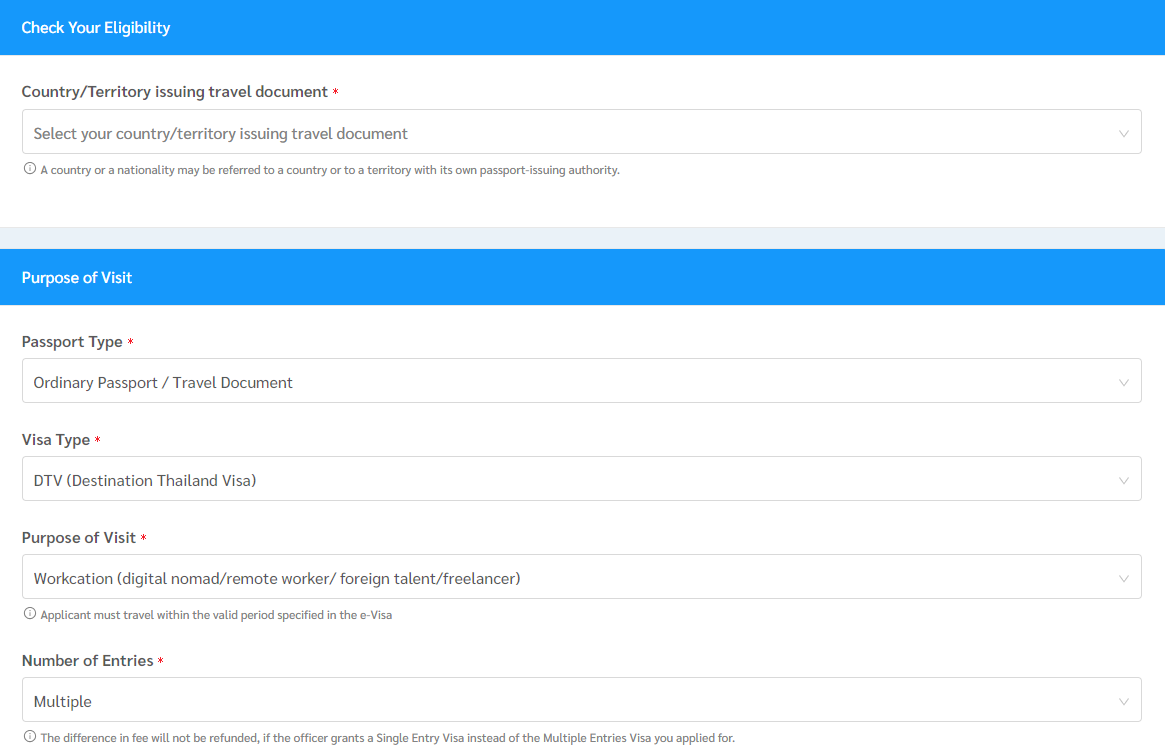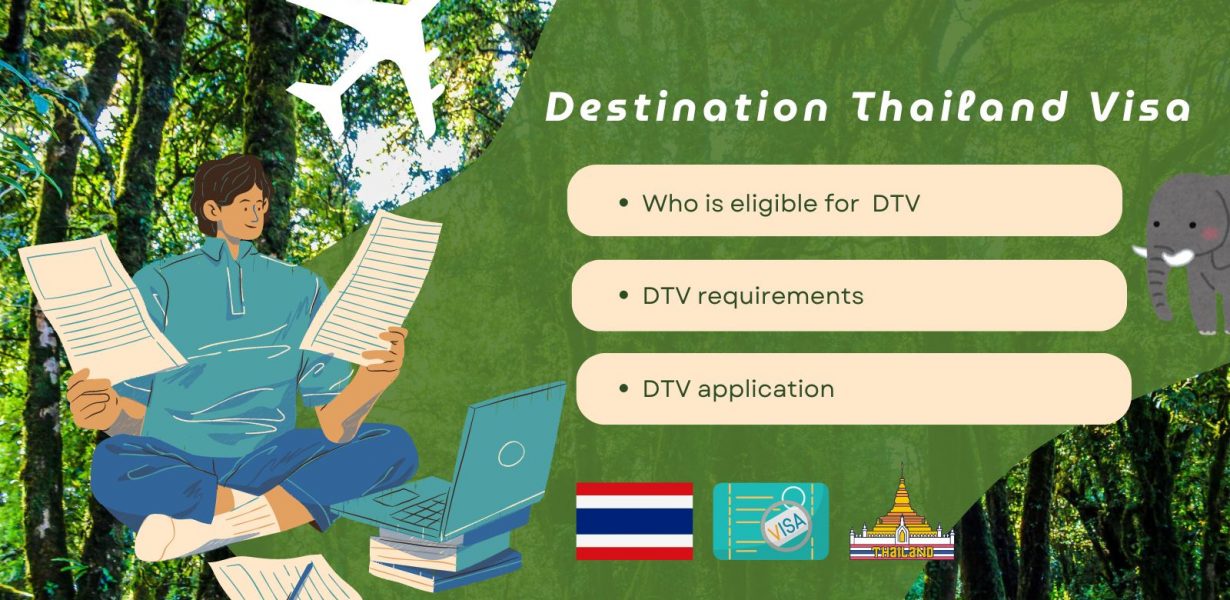Planning a long-term stay in Thailand? The Destination Thailand Visa (DTV) might be just what you need. Introduced to promote Thailand as a prime destination for digital nomads and remote workers, the DTV offers a convenient pathway to live and explore Thailand for an extended period.
In this guide, we’ll break down everything you need to know about the DTV, including eligibility, requirements, application process, and recommended destinations in Thailand.
🌴FIND AMAZING DEALS ON THAILAND TOUR PACKAGES🌊
What is the Destination Thailand Visa (DTV)?
Introduced in July 2024, the DTV visa is a game-changer for those seeking a seamless blend of work and travel in Thailand. This long-term, multiple-entry visa caters to digital nomads, freelancers, and remote workers, allowing them to legally reside and work remotely in Thailand for up to 180 days per visit. Imagine working amidst swaying palm trees, with turquoise waters lapping at the shore – the DTV visa makes this dream a reality.
Validity of Visa: 5 Years
Number of entry: Multiple
Duration of a single stay: 180 days
Cost: 10,000 THB
Extension: A 180-day extension is allowed for each entry, with a fee of ฿1,900
Who is Eligible for Destination Thailand Visa
The DTV is ideal for professionals who can work remotely, such as freelancers, digital nomads, and remote workers. Additionally, those involved in activities promoting Thailand’s “Soft Power” initiatives, like arts, culture, and education, may also be eligible.
The DTV visa allows the principal holder to bring in dependents. There is no limit to the number of family members, but they must be either a spouse or dependent children under 20 years old, and each dependent must apply and pay the visa fee separately.
Destination Thailand Visa Requirements
To secure your DTV, you’ll need to compile the following documents:
- Passport biodata page or travel document with at least 6 months remaining validity beyond your intended stay in Thailand.
- Photograph of the applicant, taken within the past 6 months.
- Document indicating current location (driving license, bank statement, or proof of stay).
- Bank documents demonstrating a minimum balance of THB 500,000 (or USD $16,000) for at least the past 3 months.
- Depending on the purpose of visit:
- Workcation: Employment contract or proof of employment in the host country, or a professional portfolio demonstrating digital nomad, remote worker, foreign talent or freelance status
- Thai soft power related activities: Proof of confirmation to attend the activity, or letter of appointment from the hospital/medical center
- Spouse and children under 20 years old of DTV visa holders: Proof of relationship with the DTV visa holder, e.g., copy of marriage certificate/birth certificate/adoption certificate
For detailed and updated information, please refer to Thai E-Visa Official Website.
How to Apply for Destination Thailand Visa
Applying for the DTV involves several steps, most of which can be completed online.
Gather Required Documents
Before you start the application, make sure you have all the necessary documents, including your passport, photos, bank statements, and any other required paperwork.
Online Application
Visit the Thai eVisa website to start your application. You will need to fill out the online form with your personal details, travel plans, and upload the required documents.

Pay the Visa Fee
The application fee varies depending on your nationality and the type of visa. Make sure to pay the fee using the available online payment methods.
Wait for Processing
Once your application is submitted, it will be processed by the Thai immigration authorities. This can take several weeks, so apply well in advance of your intended travel date.
Receive Your Visa
If your application is approved, you will receive your visa either electronically or via your local Thai embassy or consulate.
Recommended Destinations in Thailand
With your DTV in hand, you are ready to embark on your long-term stay in Thailand.
Thailand offers a diverse landscape, from bustling metropolises to serene beaches and lush jungles. Here are a few popular destinations for DTV holders, catering to both work and leisure:
Chiang Mai
Chiang Mai is a popular destination for digital nomads and remote workers alike, thanks to its affordable cost of living, relaxed atmosphere, and beautiful surroundings. The city is known for its rich culture, with numerous temples and a strong sense of community among expatriates.
Top Attractions: Doi Suthep, the Old City, Night Bazaar, and the nearby mountain town of Pai.
Bangkok
Bangkok is the capital of Thailand, known for its vibrant street life, cultural landmarks, and modern amenities. It’s an excellent base for digital nomads, offering numerous coworking spaces, cafes, and networking opportunities.
Top Attractions: The Grand Palace, Wat Pho, Chatuchak Market, and the vibrant nightlife of Khao San Road.
Phuket
Phuket is Thailand’s largest island and a top destination for beach lovers. It offers a mix of vibrant nightlife, luxury resorts, and serene beaches. For those working remotely, there are plenty of coworking spaces and cafes with stunning sea views.
Top Attractions: Patong Beach, Phi Phi Islands, Big Buddha, and the Phuket Old Town.
Krabi
Krabi is a province known for its dramatic limestone cliffs, clear waters, and laid-back atmosphere. It’s an ideal spot for travelers looking for a quieter, more relaxed environment.
Top Attractions: Railay Beach, Ao Nang, Koh Phi Phi, and the emerald pool of Thung Teao Forest.
Koh Samui
Koh Samui is a tropical paradise that combines natural beauty with modern amenities. It’s a great destination for digital nomads who want to enjoy island life while staying connected to work.
Top Attractions: Chaweng Beach, Lamai Beach, Ang Thong National Marine Park, and the famous Big Buddha.
FAQs Regarding the DTV Visa
Do I Need a DTV Visa if I’m on a Short Trip to Thailand?
For short visits to Thailand (less than 30 days), you might be eligible for a visa exemption or visa on arrival, depending on your nationality. Check with the Thai embassy or consulate in your home country for the most up-to-date information.
Do US Citizens Need a Visa to Enter Thailand?
Yes, US citizens need a visa to enter Thailand if they plan to stay for more than 30 days. The DTV Visa is an excellent option for those seeking an extended stay.
Can I Get a Thai Visa on Arrival?
Yes, Thailand offers a visa on arrival for citizens of certain countries. However, this visa is typically valid for a short stay (15 days).
How Long Does It Take to Process the DTV Visa?
Processing times for the DTV Visa typically range from 15 to 30 days, depending on the applicant’s nationality and the complexity of their application.
Can I Extend My DTV Visa Stay in Thailand?
The DTV visa itself allows you to stay in Thailand for up to 180 days per visit. There’s also a provision for a single extension of up to 180 days, subject to meeting specific criteria and paying the required extension fee.
Can I Bring My Family on a DTV Visa?
The DTV visa may allow you to bring your spouse and dependent children under the age of 20 to Thailand. Always check with Thai authorities for the latest regulations on dependents.
Conclusion
The Destination Thailand Visa (DTV) represents a significant opportunity for travelers, digital nomads, and retirees looking to experience Thailand’s unique charm for an extended period. With its new rules and simplified application process, the DTV Visa makes it easier than ever to live, work, and explore in Thailand.










There are no comments.